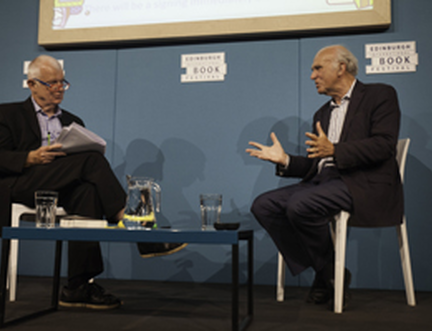More articles Thursday 25 August 2016 1:45pm
Vince Cable on Brexit, Corbyn and Scottish Independence

Sir Vince Cable presented to his Book Festival audience last night an evocative image of Britain after the Brexit vote: that of the cartoon character who’s run off the edge of a cliff but remains suspended, furiously running in mid-air.
“It changes an enormous amount,” said the economist, former Liberal Democrat MP and former business secretary, “but we haven’t seen it yet – we haven’t got to that moment.” The real issues and long-term effects, he said, are still to be teased out. Uncertainty puts off investment; and the certainties, when they emerge, will present challenges of their own.
Sir Vince distinguished between what he called the “hard” and “soft” versions of Brexit that could result from coming negotiations. Soft Brexit would constitute continued membership of the single market and the currency union, but some restrictions on freedom of movement. “But Europe may not wear it,” he said. “You’ve got to get twenty-seven countries to agree to it. And there would be a big civil war on the right. If you listen to Farage, the language is already about betrayal: the British people have been betrayed; the politicians are going to stitch it up… So it’s going to precipitate quite a violent reaction on that side.”
Hard Brexit, however – a more complete severance - presents ominous possibilities. “The economic consequences are quite extreme, and the politics becomes very complicated.” So ought the Government seek a vote in the Commons prior to triggering Article 50? “It’s a legal rather than a political question, and I think the legal advice the government is getting is that they don’t need to. But if it were to happen, I would be surprised if the House of Commons voted to reverse the referendum decision. They don’t want to be in the position of saying, ‘The people got it wrong.’” If, however, Brexit negotiations result in the ‘hard’ option, “then it would be right for Parliament to insist on quashing it – and the Liberal Democrats would campaign to nullify the result.” Scotland’s influence could then become crucial, since “if the Scottish government felt like being really awkward”, it could refuse to support a Brexit that it deemed unacceptable.
Scotland has particular significance for Sir Vince: he did his PhD at the University of Glasgow and served as a Labour Councillor in Glasgow in the 1970s. After the Brexit vote, he said. “I tried to put myself emotionally in the position of people in Scotland who voted to stay, and I would feel that I had really been shafted.”
Though in favour of the union, he expressed sympathy for those in whom Brexit might harden a desire for independence. “Paradoxically though it might become much more difficult. If you’re looking at the hard brutal realities it’s less attractive, but emotionally it’s more attractive.” He suggested that Scottish independence was perfectly possible if Scottish people were prepared to pay more in income tax, and suggested “You would have to have a separate currency, and that would help you boost exports.” Whether independence was the best economic solution for Scotland, however, he questioned – noting the irony that areas of Britain that voted to stay currently stand a better chance of post-Brexit recovery than areas that voted to leave.
Such equanimity was characteristic of a conversation in which this composed, frank speaker expressed respectful sentiments towards his political enemies (David Cameron and George Osborne were “two of the cleverest people of their generation”; Theresa May, with whom he frequently clashed over immigration when both were in Cabinet, he called “very capable; level-headed; a grown-up”) and acknowledged that its time in coalition had had “very dire consequences” for the Liberal Democrats. But he defended the decision to join the Tories in government – “There was no way of forming an alternative government” – and suggested that a “ruthless” Tory election campaign in 2015, not the record of the coalition government, that destroyed the Liberal Democrats.
Not that he regards his party’s fate as sealed. On the contrary - the Lib Dems, in Vince Cable’s estimation, may yet be the country’s best hope. “We have a gigantic hole in British politics. Jeremy Corbyn is a perfectly likable guy, but he isn’t electable. There isn’t an alternative government at the moment.” His conversations with Labour MPs suggest that “a lot of them are in complete despair. The mainstream has gone. There’s nothing they can do to pull it back.” A new centre left alternative, he suggested, is the logical result for Lib Dems and adrift Labour members alike. “My party has to recover, and try to construct an alternative government.”
- 2025 Festival:
- 9-24 August
Latest News
 Communities Programme participants celebrate success of 2024
Communities Programme participants celebrate success of 2024



